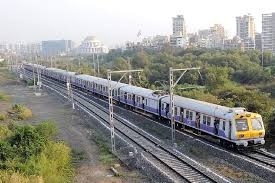Big boost for Mumbai local train services: 12 rail projects worth over Rs 16,200 crore sanctioned

Mumbai’s suburban rail network, the lifeline of the city, is set for a massive transformation. The Indian government has approved 12 railway projects worth over ₹16,200 crore. These projects aim to decongest the existing system, improve train frequency, and provide a more comfortable commuting experience for millions of daily passengers.
Why These Projects Matter
Over 80 lakh commuters use Mumbai’s local trains daily. With population growth and urban expansion, the system is under heavy pressure. Overcrowding, frequent delays, and limited train services have become major concerns.
The new projects will increase line capacity and reduce delays. They will also separate suburban and long-distance train operations on key routes. This will create a smoother travel experience and improve overall punctuality.
Key Highlights of the Projects
The projects focus on track expansion, corridor upgrades, and new routes. Here are the main highlights:
- CSMT–Kurla 5th & 6th Line (₹891 crore): This project will separate local and express trains, improving speed and reducing delays.
- Mumbai Central–Borivali 6th Line (₹919 crore): A crucial upgrade for the Western line, which faces heavy congestion.
- Borivali–Virar 5th & 6th Line (₹2,184 crore): This will allow more local trains and faster express services to Gujarat.
- Virar–Dahanu Road 3rd & 4th Line (₹3,587 crore): Will improve suburban connectivity towards Dahanu and Palghar.
- Panvel–Karjat Suburban Corridor (₹2,782 crore): A major boost for Navi Mumbai with direct Panvel–Karjat connectivity.
- Harbour Line Extension (₹826 crore): Expands the Harbour Line to Borivali from Goregaon.
- Airoli–Kalwa Elevated Link (₹476 crore): Provides smoother travel between Navi Mumbai and Thane.
Several other smaller projects, including chord line and track-doubling work, will remove bottlenecks and boost efficiency.
AC Locals and Modern Features
The suburban network will soon see 238 new AC rakes with metro-style automatic doors. These trains will replace older rakes and make travel safer and more comfortable.
Kavach and CBTC signaling will be introduced to allow more trains to run at shorter intervals. This could reduce the gap between trains to two minutes during peak hours. More trains on the track means shorter wait times for passengers.
Benefits for Commuters
The projects will increase the number of daily train services by 300–350. Commuters from extended suburbs like Dahanu, Karjat, and Panvel will benefit from faster, more reliable services.
Station upgrades are also planned under the Amrit Bharat Station Scheme. Stations like Parel, Wadala, Matunga, and Kurla will receive better facilities, escalators, modern waiting areas, and improved accessibility.
Timelines and Future Expansion
The Panvel–Karjat corridor is expected to open by December 2025. Larger projects like Borivali–Virar and Virar–Dahanu may continue until 2026 or beyond.
Officials are working to integrate these upgrades with Mumbai Metro and Navi Mumbai Metro networks. This integration will create a seamless transport system and reduce travel time across the city.
Sustainable Transport
These upgrades also focus on sustainability. The introduction of modern electric trains and energy-efficient systems will reduce emissions. More people will choose trains over road transport, cutting down traffic congestion and pollution.
Conclusion
The approval of 12 rail projects worth ₹16,200 crore signals a bold step toward modernizing Mumbai’s suburban railways. From track expansions to metro-style AC locals, the upgrades promise a faster, safer, and more comfortable commute. For millions of Mumbaikars, this investment means shorter travel times and a better quality of daily life.






